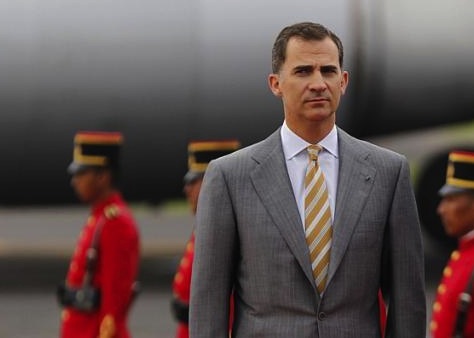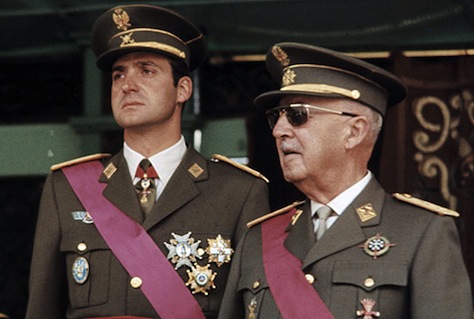Spain’s king, Juan Carlos I — who is to have once proclaimed that ‘kings don’t abdicate, they die in their sleep’ — surprised his country with the announcement earlier today that he would, in fact, abdicate the kingdom that he has held since 1975.![]()
Juan Carlos’s legacy today is undisputedly the role he played in the transition to Spanish democracy following the death of Spain’s longtime 20th century strongman Francisco Franco. As his country prepares for the inauguration coronation of his son, Felipe VI (pictured above), it’s not too early to consider whether Felipe can achieve the constitutional reforms that could mollify and temper Spain’s regionalism through some form of federalism.
It wasn’t necessarily destined that Juan Carlos de Borbón would ascend to the throne, in light of the proclamation of the second Spanish republic in 1931, Spanish king Alfonso XIII’s subsequent flight and, in 1941, his abdication after the conservative Franco came to power in 1939.
Though Franco allowed for Alfonso XIII’s grandson, Juan Carlos, to return to Spain for his education, his relationship to the monarchy remained throughout the Franco era. A conservative who supported the monarchy prior to 1931, Franco proclaimed Spain a monarchy in 1947, but that didn’t mean he was keen to hand any amount of power to the royal family. Instead, Franco left the monarchy officially vacant, ruling instead as ‘regent’ for the next 28 years. It was only in 1969 that Franco named Juan Carlos as crown prince, firmly clearing the path for Juan Carlos to succeed Franco as Spain’s head of state in 1975.
Having sworn an oath to Franco’s Movimiento Nacional (National Movement), it also wasn’t a certainty that Juan Carlos would move so swiftly transition his country toward democracy following Franco’s death. After all, Juan Carlos (pictured above with Franco) owed his position entirely to a mix of pro-Franco military forces and political elites — nationalist, fascist, conservative and monarchist.
Even after Juan Carlos announced Adolfo Suárez as his prime minister with a mandate of democratic transition, and even after Suárez himself formed Spain’s first elected government in the post-Franco era, Spain’s republicans — a mix of separatists, liberals, democrats and communists — still weren’t sure whether to trust Juan Carlos.
That changed for two reasons.
The first was the attempted coup that took place on February 23, 1981 (’23-F’), which failed in part due to Juan Carlos’s (successful) public announcement to the Spanish military ordering them not to support the coup and to remain garrisoned.
The second was the close relationship that Juan Carlos forged with Felipe González, Spain’s prime minister between 1982 and 1996, and the leader of the leftist Partido Socialista Obrero Español (PSOE, Spanish Socialist Workers’ Party).
Today, as Juan Carlos abdicates, and as his 46-year-old son prepares to succeed him, the Spanish monarchy will have the full support of much of Spain’s political mainstream. There’s still plenty of republican leftists who will use the occasion of Juan Carlos’s abdication to call for a referendum on the monarchy’s perpetuation — or its abolition altogether. It’s also true that in later years, scandals and excesses surrounding the royal family, including a hunting expedition to Botswana, where Juan Carlos injured his hip, the public expenses bringing so much negative publicity that Juan Carlos apologized to the Spanish people.
But in the context of Spain’s 20th century, the Spanish civil war and the republicanism movement, both before and during the Franco regime, it’s remarkable that Felipe VI will be crowned amid such relatively strong support for the Spanish monarchy.
What should Felipe do with that support?
Spain is still young as a democratic state, and it’s still working through the growing pains of its first major post-Franco economic crisis. The country’s economic collapse in 2008 has caused both the center-left government of José Luis Rodríguez Zapatero and the current center-right government of Mariano Rajoy, which took power in December 2011, to introduce ever-tighter budget cuts and tax increases to avoid a bailout that would have forced possibly tougher austerity requirements on Spanish finances. Six years later, Spain’s unemployment rate is still around 26% and youth unemployment in excess of 50%.
That, in turn, has highlighted the fragility of Spanish nationhood. In November, Catalunya’s regional president, Artur Mas, with the widespread support of both hard and soft Catalan nationalists, and a handful of sympathetic federalists, will hold a referendum on Catalan statehood. It’s a vote that Rajoy has declared unlawful, and as November approaches, Madrid and Barcelona seem destined for a constitutional collision course.
Meanwhile, the Catalan challenge isn’t the only regional problem vexing the Spanish central government. Though the once armed struggle has ended in Euskadi/Basque Country, Basque voters booted a federalist regional government in October 2012, returning to power a coalition headed by the Partido Nacionalista Vasco (the Basque Nationalist Party or the EAJ-PNV — in Basque, the Euzko Alderdi Jeltzalea) and, for the first time, including significant participation by the ezker abertzalea (‘patriotic left’).
In both Cataluyna and the Basque Country, regional sentiment derives in no small part from the repression of the Catalan and Basque languages and other regional traditions during the Franco era. Though today’s movement for Catalan autonomy and independence is largely an economic narrative (i.e., Catalunya, one of Spain’s economic engines, is a net contributor to the federal Spanish budget, and Catalans believe an independent Catalunya would retain more of its wealth), it’s impossible to think about Spain’s regional question without the context of the repressive Franco era. In some ways, the regionalism question remains the last major act of unfinished business for Spain’s post-dictatorial transition.
Even while Catalans agitate for independence, the clear policy solution seems to be greater regional autonomy — or even full-fledged federalism. Even if the hard separatists of the Catalan left seek independence, the less strident regionalists within Mas’s center-right Convergència i Unió (CiU, Convergence and Union) would be very happy to strike a deal with Rajoy whereby an autonomous Catalunya exists in a more federalized version of Spain.
In that sense, Felipe VI arrives at a particularly vexing time for Spain. In advance of the Catalan referendum, Rajoy and Mas are now so entrenched in their relatively centralist and regionalist positions that it will be hard for either of them to concede ground without looking weak. That gives Felipe VI the perfect opportunity to launch a national conversation on Spanish unity and the proper role of regional autonomy, not just for Catalunya and the Basque Country, but for all of Spain’s regions, from the left-leaning southern Andalusia to the more conservative, coastal Galicia.
It’s a role that’s particularly well suited for the Spanish monarchy. It would be odd to watch Queen Elizabeth II providing public and substantive opinions on the Scottish independence referendum, given that the official policymaking role of the British monarchy has been steadily in decline since before the 1707 Act of Union that joined the Scottish and English throne. But the latest iteration of the Spanish monarchy, like the modern, democratic Spain, is still new, and it owes much of its popularity to its role in crafting the modern liberal Spanish state we all know today — a Spain that joined what is now the European Union in 1986 and that was the third country in Europe to recognize same-sex marriage in 2005.
But a constitutional reckoning between Spain’s centralists and regionalists seems inevitable, sooner or later. For all the warts that the Spanish monarchy has sprouted in its first 39 years, its capstone legacy remains its role as the anchor of modern Spanish democracy. That makes it seem not only logical but natural that as Felipe VI becomes Spain’s next head of state, he’ll play an active role smoothing the path to a more workable federal structure. If he’s successful, it will mutually reinforce the 21st-century Spanish monarchy and 21st-century Spanish nationhood.


Here´s one biased assessment allright! WOW